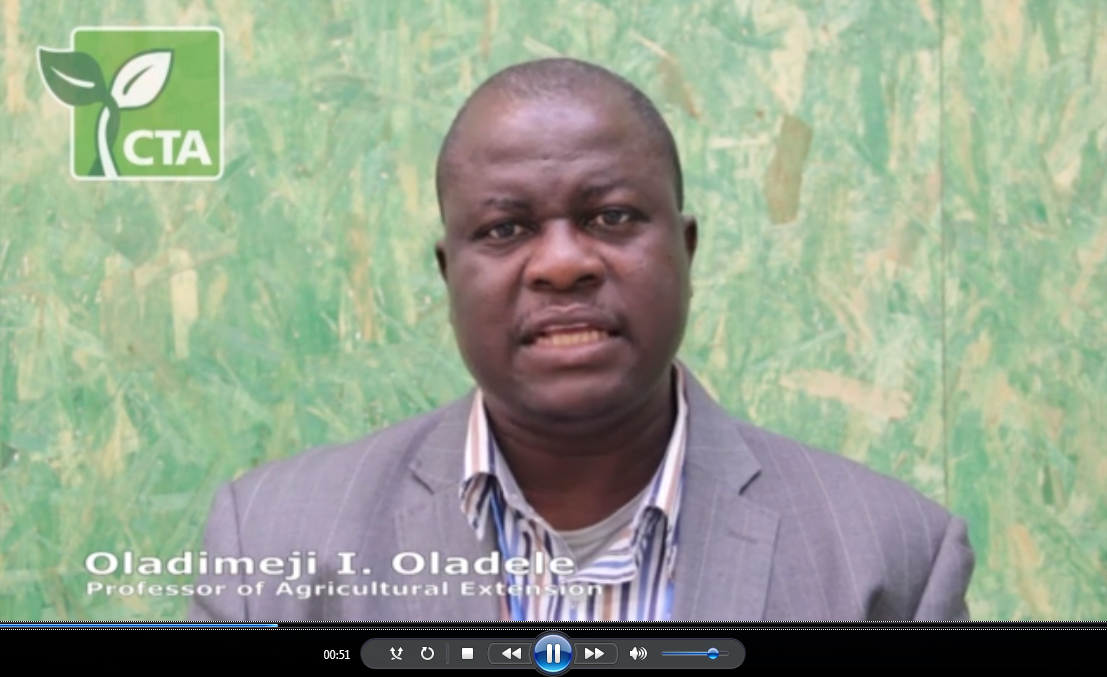What follows below, is a verbatim text transcript of a 3 minute video interview by CTA, with Professor Oladimeji I. Oladele [Professor of Agricultural Extension]
In this video, Prof. Oladele explains how Crop Farmers (in Kenya and Ethiopia) recorded 30% income rise, due to increased crop yields arising from enhanced timeliness of decision making and planning for farm production, which was made possible via use of an innovative World Bank Agro-Weather Technology platform he worked on.
NB: Prof. Oladele was the 2014 most productive researcher at South Africa’s North West University
Read the full interview narrative below…
The project I’m working on is Improving Farmers Resilience through the provision or the use of Agro-Weather tools.
It’s a project by the World Bank, sponsored by the Bank of Netherlands, and promoted by CTA.
Essentially, farmers have the problem of coping with the variation, in terms of the amount, in terms of the intensity, and the distribution of rainfall.
So, with the use of Agro-Weather tools, we are able to forecast, to know the amount of rainfall, the distribution of the rainfall, as well as the intensity of rainfall.
So this is simulated based on historical data and geo-reference data, to be able to predict what rainfall amount and intensity will be, for farmers to be able to carry out their agronomic practices and decisions within the available window of opportunity for the distribution of rainfall that is available.
This platform will simulate the climatic conditions and then release information to farmers through SMS, through Interactive Voice Response with different codes for farmers to call and get information on how to make decisions on their agronomic practices for the crops.
In Kenya, the project covered Maize, Beans, Sorghum, Coffee and Tea, whereas in Ethiopia it covered Wheat Tevs (?), Chick Peas and Lentils.
So both male and female farmers were included in the project, and then an important stakeholder, which is the input dealers are brought on board, because the information that is provided by the platform does not necessarily translate to utility.
But the farmers are monitored, and the use of the information is actually confirmed, by our ground staff monitoring the use of the advisory services that are provided.
So in this way, for every stage of production, farmers are able to take advantage of the forecast, to decide and to do what they have to do, in order not to fall outside the available rain period or the rainy days. And they are able to harness the opportunities better.
And we discovered that those who got the information were a lot better off, in terms of yield, in terms of timeliness of operations and the production. And they were able to raise their income by as much as 30%.
And also they are able to be conscious of their environment, in terms of the inputs they use, in order to keep their production very sustainable.
Click here to watch the video.
PS: By way of interest, Prof. Oladele was my co-author for the international agribusiness case sttudy paper I wrote in 2013, under the auspices of CTA.










Warning: count(): Parameter must be an array or an object that implements Countable in /home1/tayoswdg/public_html/sdnuggets/wp-includes/class-wp-comment-query.php on line 399